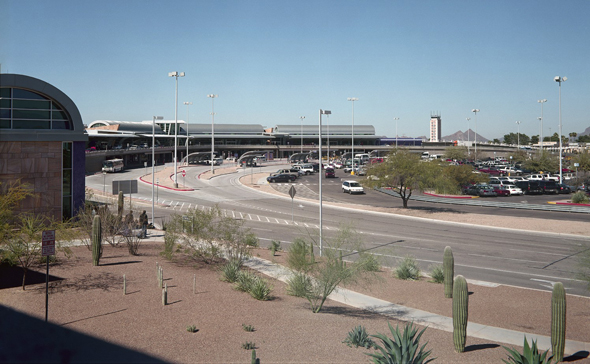The Tucson Airport Authority (TAA) Board of Directors announced this week the approval  of a first-ever Air Service Incentive program and a $43.5 million operating and capital budget for Fiscal Year (FY) 2012, which begins Oct. 1, 2011. This is an increase of approximately $6.5 million, or just under 18 percent from FY2011. The Board also approved TAA’s first-ever Air Service Incentive Program to encourage new non-stop flight destinations for the region, as well as a two-year extension of the Airport Use Agreement with the airlines operating at Tucson International Airport (TIA).
of a first-ever Air Service Incentive program and a $43.5 million operating and capital budget for Fiscal Year (FY) 2012, which begins Oct. 1, 2011. This is an increase of approximately $6.5 million, or just under 18 percent from FY2011. The Board also approved TAA’s first-ever Air Service Incentive Program to encourage new non-stop flight destinations for the region, as well as a two-year extension of the Airport Use Agreement with the airlines operating at Tucson International Airport (TIA).
Despite increases in employee benefit costs, the FY2012 budget holds operating expenses nearly flat with FY2011 levels, reflective of a challenging environment that continues in the airline industry, brought about by a weak economy and high oil prices. Nearly all of the budget increase is due to an increase in the Capital program, which fluctuates each year based on needs and availability of grant funding.
The budget also includes a reduction in the landing fee rate at TIA to $1.32 per thousand pounds of landed weight from the current rate of $1.35.
TAA President and CEO, Bonnie Allin (pictured right) said the Authority continues to work diligently to keep airline operating costs low at Tucson International Airport in order to encourage the lowest airline ticket prices possible for their customers. The reduced landing fee rate is a result of TAA staff maintaining tight control of expenses, which according to Allin, will continue to be a top priority during the continuing period of depressed revenue growth.
operating costs low at Tucson International Airport in order to encourage the lowest airline ticket prices possible for their customers. The reduced landing fee rate is a result of TAA staff maintaining tight control of expenses, which according to Allin, will continue to be a top priority during the continuing period of depressed revenue growth.
Operating revenues are projected to increase $800,000 or 1.9 percent over FY2011, excluding signatory landing fee revenue, which is reflecting an increase of $116,000.
Allin said that TAA staff has prepared a budget that continues to keep costs in check while making sure to efficiently and cost effectively maintain airport facilities and infrastructure in optimum condition and to prevent more extensive remedial work in the future. Operating expenses are budgeted to increase by only $170,000 or 0.6 percent from FY2011.
The FY2012 Capital Improvement Program, totaling $10.6 million, includes a variety of projects at both TIA and Ryan Airfield. As has been the case over the last several years, the focus of the capital plan this fiscal year is on maintaining existing facilities and enhancing security and safety. Of this total, $8.6 million is expected to be funded through federal and state grants.
The implementation of TAA’s Air Service Incentive program, which will go into effect with the new fiscal year beginning October 1, is designed to attract service to new domestic and international non-stop destinations from TIA. There are three categories of incentives, including Domestic Short Haul, Domestic Long Haul and International. Based on the type of service proposed, landing and other fees would be waived and TAA would provide marketing support for up to one year. Additions to existing routes would not be eligible.
This program, according to Allin, will make TAA more competitive when it comes to attracting additional air service to the region by mitigating risk for airlines on new routes, giving the Authority one more tool in their efforts to attract new air service once an improving economy and stabilization of oil prices encourages airlines to grow.
The Airport Use Agreement between TAA and its signatory airlines establishes the terms and conditions under which the airlines operate at TIA, including the methods for calculating rates and charges. The two-year extension to the existing agreement will run through Sept. 30, 2013.




